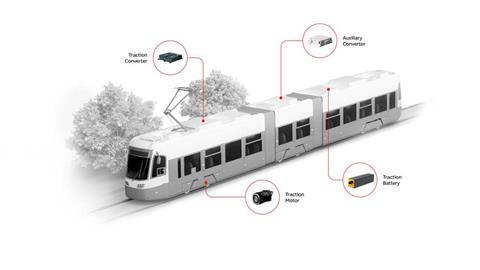The global rail sector is in the midst of a major transformation, driven by the need for more sustainable and energy-efficient transportation. With the world moving toward greener mobility solutions, the shift to fully electric rail vehicles is emerging as a pivotal advancement in the industry.
ABB, a global leader in electrification and automation, is at the forefront of this change, offering a range of innovative traction solutions that are helping the rail sector embrace a more sustainable future.
The Case for Fully Electric Rail Drivetrains
The adoption of fully electric propulsion represents a significant leap forward for the rail industry. These systems offer a host of benefits, from reducing environmental impact to lowering operating costs. As rail operators look for ways to cut emissions and meet climate goals, electric powered trains provide an effective solution, producing zero emissions at the point of use.
Countries like Norway and Switzerland have already made substantial progress in electrifying their rail networks, showcasing the potential for fully electric trains to operate sustainably on a large scale. By drawing on renewable energy sources like hydrogen, wind, solar, or hydroelectric power, electric trains can drastically reduce or even eliminate their carbon footprint. This transition aligns perfectly with global efforts to decarbonize the transportation sector.

Reducing Environmental Impact
One of the most significant advantages of fully electric trains is their ability to reduce emissions. Diesel-powered trains, which still dominate many rail networks, contribute significantly to greenhouse gas emissions. Electric trains, on the other hand, produce no direct emissions, making them a key component in reducing the environmental impact of rail transport.
ABB’s traction battery systems are instrumental in supporting the shift to electrified rail. These batteries enable the operation of hybrid or fully electric trains on non-electrified routes, helping countries like Austria and Australia in their efforts to decarbonize railways. For example, ABB’s solutions were essential in the development of hybrid maintenance vehicles for the Austrian Federal Railways (ÖBB), reducing both emissions and reliance on diesel.
Improving Efficiency and Lowering Costs
Electric drivetrains are significantly more energy-efficient than their diesel counterparts. Electric motors typically operate at 90% efficiency, compared to the 35-45% efficiency of diesel engines. ABB’s traction converters and motors are designed to maximize this efficiency, allowing rail operators to reduce energy consumption while improving overall performance.
In addition to efficiency gains, electric trains also offer lower maintenance and operating costs. Diesel engines require more frequent maintenance due to their complexity and the high number of moving parts. Electric drivetrains, by comparison, have fewer components, reducing the likelihood of mechanical failure and service disruptions. ABB’s auxiliary converters also play a vital role by powering onboard systems like lighting, heating, and air conditioning with optimal efficiency, ensuring a comfortable experience for passengers while minimizing energy use. ABB’s service solutions, including digital monitoring and preventive maintenance, help rail operators ensure that their electric systems run efficiently and with minimal downtime. For example, ABB’s complete traction chain upgrade for Romania’s locomotives will increase reliability while reducing operational costs for the rail operator, CFR Calatori.
Versatile Solutions for Every Rail Application
ABB’s traction systems cater to a wide range of rail applications, from light rail vehicles and metros to regional trains and high-speed locomotives. This scalability allows rail operators to implement fully electric solutions that are tailored to their specific needs. Whether it’s urban transit systems or long-distance travel, ABB’s solutions are designed to optimize energy use while maintaining reliability and passenger comfort.
ABB’s recent work with Adelaide Metro in Australia, where it helped convert diesel trains into hybrid electric vehicles, underscores the versatility and scalability of electric drivetrains. These retrofits are setting a new standard in the region and demonstrate how existing rail infrastructure can be transformed to meet modern sustainability goals.
Future-Proofing Rail Transport
Electrically powered trains are not only efficient and environmentally friendly but also adaptable to future technological advancements. As innovations in battery technology and charging infrastructure continue to evolve, electric trains will be able to operate in areas without overhead electric lines, reducing infrastructure costs and further expanding their applicability.
ABB is leading the way in future-proofing rail systems, making them ready for the next generation of rail transport. From light rail vehicles to high-speed trains, ABB’s solutions offer the flexibility needed to meet the demands of modern and future rail networks. The ongoing improvements in battery technology are paving the way for fully autonomous and hybrid-electric operations in regions previously reliant on diesel-powered trains.
As the rail industry looks to the future, ABB is proud to showcase its latest traction solutions at InnoTrans 2024, the leading international trade fair for transport technology. Visitors to InnoTrans can find ABB at Hall 9, Booth 320, where industry experts will be available to discuss the company’s cutting-edge offerings. Additionally, an ABB expert will be speaking at the Speaker’s Corner, highlighting how ABB is driving sustainable rail transport through electrification and automation.
Conclusion: Powering the Rail Industry’s Energy Transition
The shift to fully electric propulsion is not just a trend—it’s the future of sustainable transportation. ABB’s traction solutions are at the heart of this transformation, offering rail OEMs and operators around the world the tools they need to reduce emissions, lower costs, and improve efficiency. As the rail industry continues to evolve, ABB’s innovations in electric drivetrain technologies will play a crucial role in shaping a greener, more efficient, and more reliable transportation system for generations to come.


















